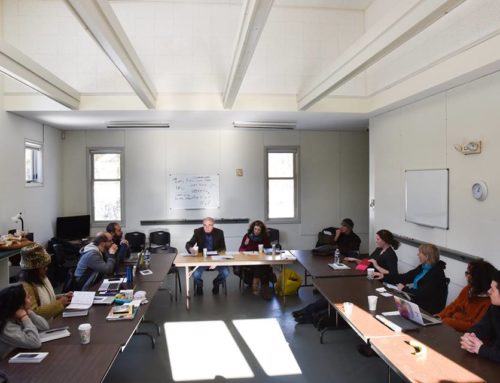Sitting with my wife this morning discussing the novel she’s in the middle of writing, she shared with me that in her last writing session she had to put the brakes on her forward progress and go back and insert certain details that she’d rushed right over on her first pass through a section of her story.
This brings up an interesting question for writers of any kind of fiction: Should you stop your forward progress as you push through your first draft to go back and insert material into territory you’ve already covered–or–is stopping your forward momentum on your first pass through worth the risk of derailing your forward progress?
As we discussed this, I realized that there really isn’t a definitive answer. Some writers, like the late Pulitzer Prize winner Lanford Wilson once told me, it is imperative for him to just push through that first draft and never stop and go back. Along the way, he takes quick notes of ideas he might later go back and add. But for him it was imperative to just push through to the end and then insert what else is needed throughout.
Lanford explained: “I’m writing pages, I’m not writing a play. I’m writing 90 or 102 pages, that’s all I’m trying to do. I’m just trying to stack up work–in other words, to keep going…if something comes up…I’ll just make a note and go on as though I’ve made the change. And then, as soon as I’ finish, I go back and change all that.”
On the other hand, sometimes in my experience there are plot elements that you suddenly discover you’ve skipped over or that present themselves out of the blue that need to be addressed on the spot. And the reason is that these “discoveries” have the potential to radically change the part of your story that you haven’t pushed through yet.
So there’s really no definitive answer to this. You just have to slog your way through that draft, whether or not you occasionally stop and go back and fix or you take Lanford’s approach and finish your first draft and then go back and make adjustments. Then again, maybe it’s a combination of both…?
It’s a messy business.
* * * *
I’m a playwright and screenwriter, producing partner in my production company Either/Or Films (The Sensation of Sight and Only Daughter) a professional script consultant, and the author of The Playwright’s Process. I’m also on the faculty of the MFA Writing Program at the New Hampshire Institute of Art. You can follow me on Twitter @eitherorfilms or @mfastagescreen and I’m on Facebook at buzzmclaughlinscriptconsulting. If you’re interested in the possibility of working with me as a script client, email me at buzzmclaughlin@gmail.com and we can start a dialogue.







Typically, I like to address the changes sooner than later, mostly because the idea of slogging back through a mess of words/pages is terrifying to me – I'd like them to be as clean/ready as possible, so I don't feel overwhelmed "fixing" things later.
However, my current piece is really personal and intense for me to write, and I found that it was important to just POUR it out, rip it out of my heart, and my mentor and I are going to see what needs to be done to fix it up once I've poured it out. This is a new way of drafting for me, but one that felt right for THIS project. So I know things change, but I think (in general) I definitely like to have the first draft be cleaner/more ready versus just a lot of pages of possibility.